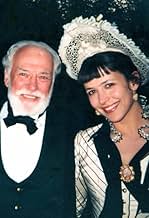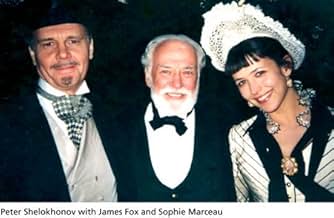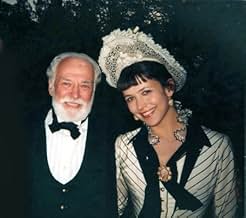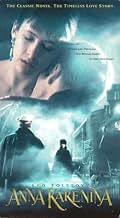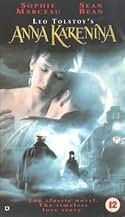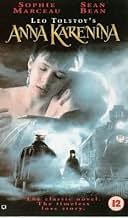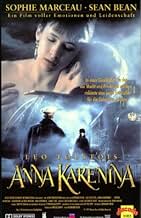CALIFICACIÓN DE IMDb
6.3/10
6.3 k
TU CALIFICACIÓN
Anna (Marceau) es una esposa y madre que tiene una aventura con el apuesto conde Vronsky. Basado en la novela de Tolstoi.Anna (Marceau) es una esposa y madre que tiene una aventura con el apuesto conde Vronsky. Basado en la novela de Tolstoi.Anna (Marceau) es una esposa y madre que tiene una aventura con el apuesto conde Vronsky. Basado en la novela de Tolstoi.
Petr Shelokhonov
- Kapitonich, Chief Butler
- (as Pyotr Sholokhov)
- Dirección
- Guionistas
- Todo el elenco y el equipo
- Producción, taquilla y más en IMDbPro
Opiniones destacadas
Now, perhaps I'm out of my element writing a review for "Anna Karenina" without having read the book, but I shall do so regardless. Many criticised this film because it did not follow the book, or omitted one thing or another. That is all well and good, but what feature-length film *can* capture the entire scope of a novel the size of "Anna Karenina"? I watched the older version with Greta Garbo and--though I cannot imagine why--it never truly caught my attention. This version, however, captured me from the start. And I am usually the first one to complain about what is wrong with a remake in comparison to the old version. A paradox, indeed.
This film first caught my eye because of Sophie Marceau. I admire her immensely as an actress, having seen her in several films, both French and English. Then, I recognised Bernard Rose as the director of "Immortal Beloved", a film I had enjoyed some months before, mostly due to a magnificent performance by Gary Oldman, some of the most glorious music caught on film.
The music, I can probably cite as one of the main reasons I loved this film. I can think of no better love theme for a doomed romance like that of Anna and Vronsky, than the first movement of Tchaikovsky's Sixth Symphony. The use of "Swan Lake" at various points was also wonderful, and the interplay during the scene at the ballet held me mesmerised. Vronsky speaks of Anna being trapped in her marriage as the Prince seeks to capture the Swan Queen. Perhaps I'm just rambling, but somehow that connected.
On the whole, the performances were good. Sophie Marceau was perfectly believable as Anna, and some of her scenes sent chills down my spine, though my favourite performance of hers still has to be "Firelight". Sean Bean had me worried for a few seconds, with a mannered reading or two, but improved quickly as the film progressed. Another reviewer pointed out that Vronsky was meant to be a shallower character than Anna, and now that I think back on it, I believe that is very true, and that Sean Bean's performance reflected this superficiality. Mia Kirshner was adequate--I didn't particularly care for her--but Alfred Molina and James Fox both gave fine performances (a standout for me was when Anna wrote Karenin from Italy and Karenin wavered before refusing to let her see Sergei).
However, equally on par with the actors, was the setting. Very few films, I have to admit, can look *so* beautiful. Especially the ballroom scene, with the seemingly neverending hallway of gilded doors, the location photography was spectacular. The costumes were stunning, and the cinematography made even snow seem alive. Even if you do not care for the story or the acting, this is a film to watch for visuals.
Thus, I believe that this film deserves far more credit than it received. I, personally, loved it for varied reasons, but I have to admit that what truly captured me was the way Bernard Rose can take an average script and transform it into a beautiful film using visuals and music. Very few directors take the time to put music and image together if they use classical scores (my favourites would be David Lean and John Boorman), and I believe Bernard Rose should be watched in the future. I should love to see what he would do with a film set in late 19th century Italy, when opera was at its height!
***1/2 out of ****
This film first caught my eye because of Sophie Marceau. I admire her immensely as an actress, having seen her in several films, both French and English. Then, I recognised Bernard Rose as the director of "Immortal Beloved", a film I had enjoyed some months before, mostly due to a magnificent performance by Gary Oldman, some of the most glorious music caught on film.
The music, I can probably cite as one of the main reasons I loved this film. I can think of no better love theme for a doomed romance like that of Anna and Vronsky, than the first movement of Tchaikovsky's Sixth Symphony. The use of "Swan Lake" at various points was also wonderful, and the interplay during the scene at the ballet held me mesmerised. Vronsky speaks of Anna being trapped in her marriage as the Prince seeks to capture the Swan Queen. Perhaps I'm just rambling, but somehow that connected.
On the whole, the performances were good. Sophie Marceau was perfectly believable as Anna, and some of her scenes sent chills down my spine, though my favourite performance of hers still has to be "Firelight". Sean Bean had me worried for a few seconds, with a mannered reading or two, but improved quickly as the film progressed. Another reviewer pointed out that Vronsky was meant to be a shallower character than Anna, and now that I think back on it, I believe that is very true, and that Sean Bean's performance reflected this superficiality. Mia Kirshner was adequate--I didn't particularly care for her--but Alfred Molina and James Fox both gave fine performances (a standout for me was when Anna wrote Karenin from Italy and Karenin wavered before refusing to let her see Sergei).
However, equally on par with the actors, was the setting. Very few films, I have to admit, can look *so* beautiful. Especially the ballroom scene, with the seemingly neverending hallway of gilded doors, the location photography was spectacular. The costumes were stunning, and the cinematography made even snow seem alive. Even if you do not care for the story or the acting, this is a film to watch for visuals.
Thus, I believe that this film deserves far more credit than it received. I, personally, loved it for varied reasons, but I have to admit that what truly captured me was the way Bernard Rose can take an average script and transform it into a beautiful film using visuals and music. Very few directors take the time to put music and image together if they use classical scores (my favourites would be David Lean and John Boorman), and I believe Bernard Rose should be watched in the future. I should love to see what he would do with a film set in late 19th century Italy, when opera was at its height!
***1/2 out of ****
I saw this movie almost accidentally and I LOVED it! It made me a fan of Sophie Marceau, a beautiful and talented French actress. To my delight Sophie is starring in some upcoming movies (which I will not miss). I would recommend this movie to anyone looking for a movie with all the components that makes a classic. Too bad it didn't hit the mainstream, it was very under-rated. Bottom line: I loved this movie, and I am usually quite picky about which movies I say that about!
This was surprisingly good. I'm not that much a fan of the Romance genre, if truth be told, but I'll make an exception for this one. The film is carefully crafted. Every emotion, every dialogue enhanced the overall tone of the film, slowly but surely escalating in its momentum up to its tragic climax.
Sophie Marceau was brilliant. As was Sean Bean. I wasn't quite sure if they would be able to possess the kind of chemistry needed to pull this off, if truth be told, considering how they (in my opinion) seem to be of different temperament artistically (Sophie being more sensitive as seen in Braveheart and Marquis, while Bean is more explosive). Nevertheless, it worked out fine although, ironically, their relationship seem to be more believable whenever they fell out of odds with each other. :)
Sophie Marceau was brilliant. As was Sean Bean. I wasn't quite sure if they would be able to possess the kind of chemistry needed to pull this off, if truth be told, considering how they (in my opinion) seem to be of different temperament artistically (Sophie being more sensitive as seen in Braveheart and Marquis, while Bean is more explosive). Nevertheless, it worked out fine although, ironically, their relationship seem to be more believable whenever they fell out of odds with each other. :)
Of all the versions of the Tolstoy novel which I have seen (two with Greta Garbo, the deplorable one with Vivien Leigh, another with Jacqueline Bisset), this is the one that really reflects the scope and social observation of the book. The careful direction and art direction, the St.Petersburg backgrounds, as well as the exquisite cinematography, make this movie a real feast for the eyes, with magnificent plastic compositions and lighting in every shot. The abused Tchaikovsky music was used discreetly. Sophie Marceau plays a very young Anna, and makes her credible all the time. Sean Bean and James Fox, as Vronsky and Karenin, are admirable. And even if the screen play by director Bernard Rose is a little too literary, the complete story was told, and the result was the best Anna Karenina the screen has offered.
I disagree that this was terrible. I am a big time historical movie and costume buff, so I watch everything I can get my hands on and there is hardly a period drama I have not seen. I have also read the book. While the story line of the movie doesn't necessarily follow the novel, I am still sucked into it every time I see it. I found their chemistry wonderful, the costumes lovely and very period accurate, the music and cinematography fabulous. I have seen it over a dozen times (bought the DVD) and STILL never get bored. Sophia Marceau was a perfect choice in my opinion. She is classically beautiful, and the right combination of all the elements that made her character.....chaste wife turned star crossed lover, strong, confidant woman melted to vulnerable young girl. I adored Sean Bean also. I found him totally believable, and I fail to understand how anyone even remotely interested in period dramas could fail to appreciate this film.
¿Sabías que…?
- TriviaThis was the first western production of "Anna Karenina" to be filmed in Russia (St. Petersburg).
- ErroresDuring the movie, title cards inform the viewer that the story arch unfolds in the years 1880 to 1882 - yet at the end of the movie Vronsky leaves to fight in the Russo-Turkish war of 1877- 1878.
- Citas
Anna Karenina: What are you doing here?
Vronsky: You know that I have come to be where you are. I cannot help myself.
- ConexionesReferenced in 13 posterunek: Kalambury filmowe (1998)
- Bandas sonorasSymphony No. 6 in B Minor, op. 74 (Pathetique)
Written by Pyotr Ilyich Tchaikovsky (as Peter Ilyich Tchaikovsky)
Performed by The St. Petersburg Philharmonic Orchestra
Conducted by Georg Solti (as Sir Georg Solti)
Courtesy of Icon Records and London Records
Selecciones populares
Inicia sesión para calificar y agrega a la lista de videos para obtener recomendaciones personalizadas
- How long is Anna Karenina?Con tecnología de Alexa
Detalles
- Fecha de lanzamiento
- Países de origen
- Sitios oficiales
- Idiomas
- También se conoce como
- Leo Tolstoy's Anna Karenina
- Locaciones de filmación
- Productoras
- Ver más créditos de la compañía en IMDbPro
Taquilla
- Presupuesto
- USD 35,000,000 (estimado)
- Total en EE. UU. y Canadá
- USD 858,553
- Fin de semana de estreno en EE. UU. y Canadá
- USD 75,268
- 6 abr 1997
- Total a nivel mundial
- USD 858,553
- Tiempo de ejecución1 hora 48 minutos
- Color
- Mezcla de sonido
- Relación de aspecto
- 2.35 : 1
Contribuir a esta página
Sugiere una edición o agrega el contenido que falta

Principales brechas de datos
By what name was Anna Karenina (1997) officially released in India in English?
Responda

